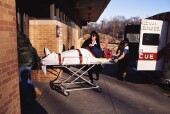
WEDNESDAY, May 23 (HealthDay News) — The largest study of its kind finds that stroke patients benefit from a clot-busting drug even six hours after a stroke, suggesting that the current recommended 4.5-hour limit could be expanded.
The drug, called tissue plasminogen activator (tPA), can make a huge difference for patients who suffer ischemic strokes, which are caused by blockages in blood vessels. The drug dissolves blood clots, potentially preventing damage in the brain.
Guidelines had suggested that the drug must be given within three hours of a stroke to work, but recent research indicated that the time frame could be extended to 4.5 hours, said Dr. Ying Xian, a cardiology research fellow at Duke Clinical Research Institute, who was not involved with the new study.
Now, Xian said, the new research, while it has caveats, suggests that the window could be expanded even more.
In the new study, researchers led by Peter Sandercock of the University of Edinburgh and Western General Hospital in Scotland examined the medical records of 3,035 patients in 12 countries, 1,515 of whom received tPA. After six months, slightly more of those who got tPA — 37 percent vs. 35 percent — were alive and independent.
There was a slight benefit for those who received tPA within six hours. However, the benefit was much greater for those treated within three hours of a stroke, the investigators found.
The findings “add weight to the policy of treating patients as soon as possible, and justify extending treatment to patients older than 80 years of age,” the researchers wrote in the report published in the May 23 online edition of The Lancet.
Xian cautions that the medical facilities in the study “are required to have an organized system of stroke care, similar to stroke centers in the U.S. Thus, the results obtained from this study may not be generalizable to small, inexperienced and community hospitals outside of the trial setting.”
And the findings don’t mean that stroke patients should wait to get treatment, Xian stressed. “Based on this study, as well as previous research, the benefit is greatest in patients who arrive and get treated early. It is critical for the public to be aware of the stroke symptoms. Call 911 immediately at any sign or symptom of stroke. Time lost is brain lost.”
According to the National Stroke Association, people should learn to recognize the warning signs of stroke and remember the acronym “FAST”:
- Face: Does one side of the face droop when the person tries to smile?
- Arms: Does one arm drift downward when the person tries to raise both arms?
- Speech: Does the person have trouble repeating a simple phrase or is their speech slurred or strange?
- Time: If any of these signs occur, call 911 immediately.
More information
To learn more about stroke, visit the National Stroke Association.

